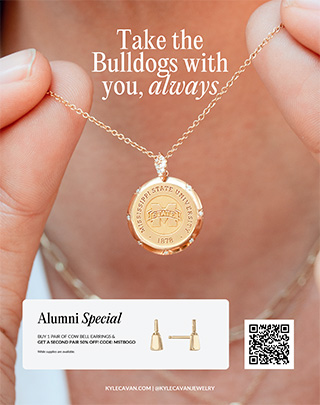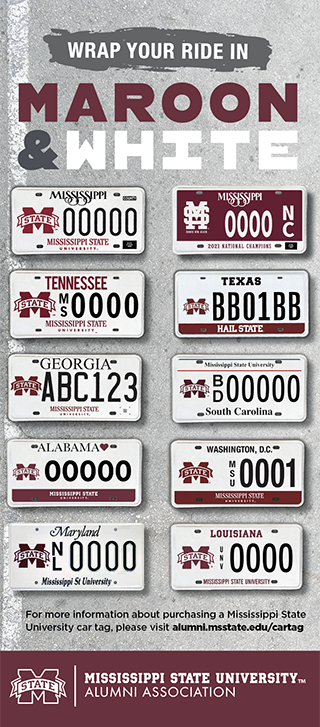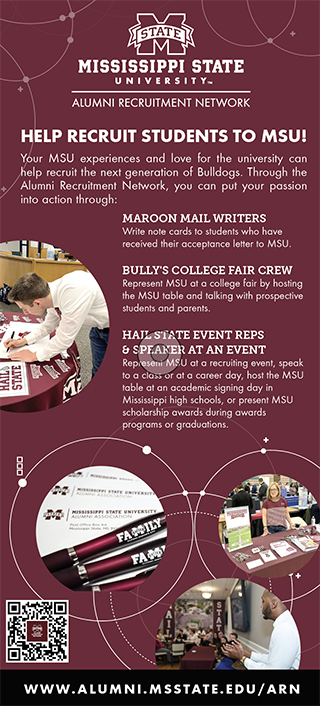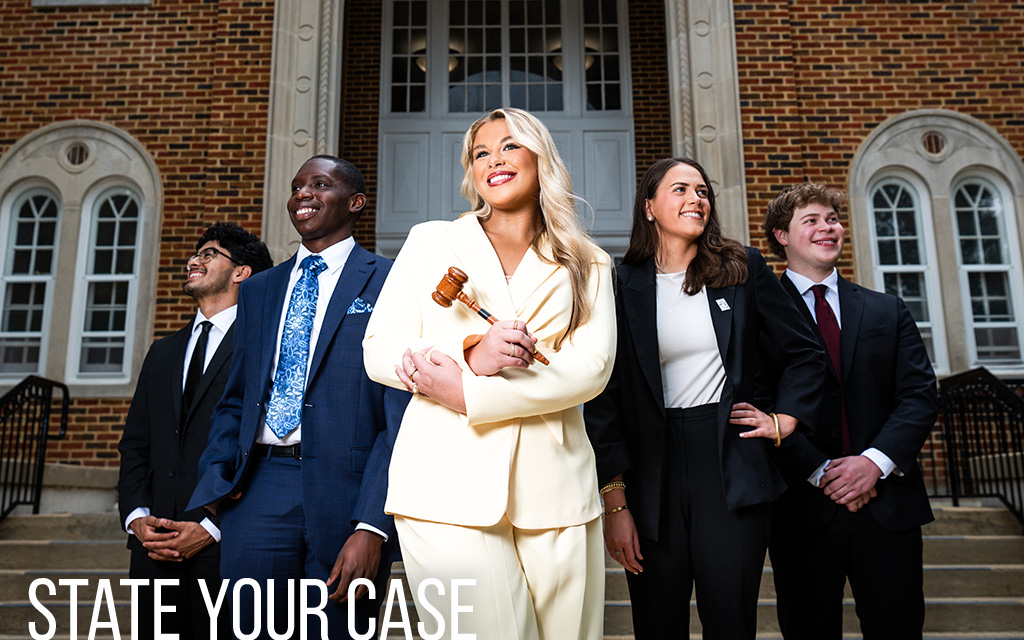
MSU partnerships create accelerated, in-state pipelines for future Bulldog lawyers
When Ryan Jarratt walked into his first class at Columbia Law School in New York City, he arrived with an advantage none of his peers from Harvard, Georgetown or Stanford had: a well-rounded education from Mississippi State.
Jarratt, a Vicksburg native who earned bachelor’s degrees in political science and philosophy in 2022, said sitting next to some of the brightest minds from the most prestigious universities in the country deflated his confidence—at first. He wondered if he would succeed, but those fears disappeared as he proved Bulldogs not only can make it at one of the toughest law schools in the nation but also thrive in its demanding environment.
“There was a bit of an intimidation factor at first because there were very few people coming from either state schools or schools in the South. I found out pretty quickly, though, that the classes I took and the professors I had at Mississippi State prepared me to compete with those other students in every way,” the now-Juris Doctor candidate said. “At Columbia, I finished my first year with an Honors designation, became a managing editor of the Columbia Law Review, competed in the law school’s moot court competition and have been selected for great summer internships. All of that happened because of my time at MSU.”
Although known more for its engineering and agricultural programs, MSU is the first stop in higher education for many future attorneys. Now, agreements with two other Magnolia State universities allowing students to fast-track their undergraduate and law school degrees could bring more aspiring barristers to Mississippi State.
Last year, MSU entered into partnerships with Mississippi College and the University of Mississippi allowing Bulldogs to enter the schools’ Juris Doctor programs before finishing their bachelor’s degrees, shaving time off the total length of their higher education careers by one year.
Referred to as a 3+3 program—three years for an undergraduate degree and three years for a law degree—participating students who have completed three-fourths of the coursework required for a bachelor’s degree will be eligible for admission to the two law schools. After completing their first year of law school—earning 30 hours of credit—MSU will award their appropriate undergraduate degrees. The law school then will award its professional degree after completion of the Juris Doctor program.
The accelerated 3+3 programs begin this year, and both meet American Bar Association requirements. Both MC and UM will waive application fees and other costs for MSU students.
“These accelerated academic pathway agreements significantly benefit MSU students who want to pursue law degrees in their home state,” MSU President Mark E. Keenum said last fall. “It’s an exceptional opportunity for students, our institutions and the state of Mississippi.”
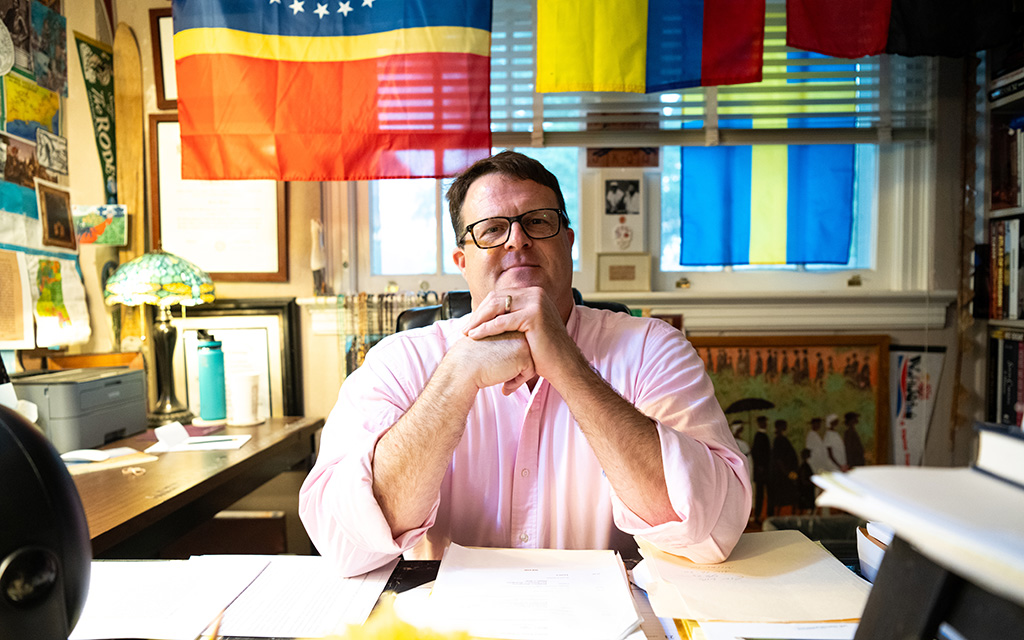
‘The real deal’
When Whit Waide arrived at MSU as an instructor in the political science department almost two decades ago, he was determined to give undergraduate Bulldogs a real law-school experience.
After earning an English degree from Millsaps College, Waide enrolled at Ole Miss Law. The advice he received from others before starting law school fell short of truly preparing him for what lay ahead, he said.
“Everyone told me to take a lot of classes where you read and write papers. You then get there, and it’s so fundamentally different than any education you’ve ever had. Of course there’s writing, but law school really does rewire your brain and forces you to think differently,” he said. “That’s why it’s so important to me to provide more exposure and illuminate what law school is really like, to the extent you can as an undergraduate instructor.
“I want these students to experience the real deal, so they know exactly what to expect when they walk through those doors on their first day,” Waide explained. “I want their first day to not really be their first day.”
While MSU does not have a pre-law major, Waide helped create and now oversees the university’s pre-law minor. The current 19-hour curriculum is interdisciplinary and touches many areas of campus. From specific electives on legal writing in the English department and international law in the College of Business to psychology- and sociology-based classes in their respective departments, students with a wide range of interests easily can find a pathway into jurisprudence-related topics.
“This is a land-grant school which is perfect for preparing students for law school because there’s a pragmatism to us that others do not have,” Waide said. “Our philosophy is a little bit different than others: There’s an element of classical education—the liberal arts and core curriculum-type classes—but there’s also the practical application of learning.
“The classes we want students to take are about teaching critical thinking and how to build ideas and make sound arguments. Anybody can read case law; it’s about understanding and applying ideas,” he continued. “Mississippi State does a better job at pre-law preparation than most places in the country because we put a lot of effort and energy into making sure that you know all you need to know and can do all you can do before you start that endeavor. I’ve had former students in law school tell me, ‘I’m so glad I took legal writing at State because I’m not as lost as everyone else is here.’”
‘I was ready for it’
The only “B” Sumner Fortenberry made as an MSU undergraduate was in Associate Professor Matthew Little’s Principles of Legal Writing.
“I still cuss him to this day,” Fortenberry joked, “but I was young and arrogant, and I deserved it. It’s still wild to think about it, but he really shaped me as a legal writer when I was just a 19-year-old sophomore.”
After graduating from MSU in 2018 with a near-perfect GPA and a bachelor’s degree in political science, Fortenberry attended the University of Virginia for law school. There, the Tupelo native had a similar experience as Jarratt. In his first-year torts class he sat beside an Ivy League graduate who previously won the TV gameshow “Jeopardy!”
“I just remember thinking I was out of my league,” said Fortenberry, who was named MSU’s Political Science Undergraduate Student of the Year in 2018. “However, as the year went on, I couldn’t believe how well I could handle those classes because of what I learned at MSU and how Whit Waide taught me to take them.
“I soon realized that even though I’m sitting next to a proven genius who was much brighter and more capable in the raw than I was, I had more of pre-existing understanding of how the class worked,” he added. “It was so meaningful for Whit to focus on teaching you how to think like a lawyer before you went to become one, and it just made me way more confident throughout my whole law-school experience.”
Fortenberry earned his law degree in 2021 and clerked for Judge Leslie H. Southwick on the Fifth Circuit Court of Appeals. He later joined Bradley Arant Boult Cummings LLP—simply known as Bradley—where he practices construction, commercial and appellate litigation at the firm’s Jackson office.
“It all got started at Mississippi State, thanks to Whit. He and the university are such huge parts of my professional and personal trajectories,” Fortenberry said. “His impact on the lives of current lawyers all across the country is pretty hard to overstate.
“Those law-related classes and the professors who teach them are really what make State a dark horse for those thinking about law school. Pre-law might not be on the marquee, but MSU allows you to dip your toe into the legal environment. That’s the highest and best purpose of a university—to let you try new things,” he continued. “There are many people I went to law school with who were burdened with hundreds of thousands of dollars of debt from their undergrad years and weren’t as prepared as I was. They may have had different opportunities than I did at MSU, but we were there together, sitting in the same seats, learning the same law. The difference? I was ready for it.”
Story by Carl Smith, Photos by Grace Cockrell

Aspiring Bulldog barrister grows student-led Pre-Law Society
Exiting Pre-Law Society President Laney Hulbert had a simple goal for the group in her final year at Mississippi State: prepare students as soon as possible for the unexpected challenges of getting into law school.
“When I started, I didn’t realize it was going to take months to apply or how much it was going to cost,” she said. “As I was learning how to navigate law school applications, I realized I wished I had someone who went through the process helping me. That’s when I knew I could help others.”
Through her leadership, the Pre-Law Society grew to approximately 300 members and now tours regional law programs, hosts distinguished speakers and holds workshops on a variety of topics students will encounter as they work toward a Juris Doctor.
“I don’t think people realize how many Bulldogs are considering law school. There was so much interest in our first meeting after a hiatus that I almost didn’t have a big enough room,” she said. “Now, there are so many freshmen and sophomores at our meetings. Getting this exposure at such an early point will give them a leg up over their peers.”
Hulbert, a political science and criminology double major, wrapped her Bulldog undergraduate career this spring and will attend the University of Mississippi School of Law in the fall. While she was accepted to numerous law programs across the Southeast, the Lucedale native said she wanted to remain in Mississippi and stay close to family.
“Leading the Pre-Law Society has been incredibly rewarding me. I feel like I am actually helping people,” she said. “I’m going to take all those lessons I’ve learned from working with students and apply them in the future.
“MSU is truly my favorite place on Earth, and the pre-law minor is a hidden gem,” Hulbert continued. “Here, I felt so nurtured and cared about, and that made me flourish as a student and as a person. I tell people I’m attending the University of Mississippi, not Ole Miss. I’ll be a Bulldog ‘til the day I die.”



